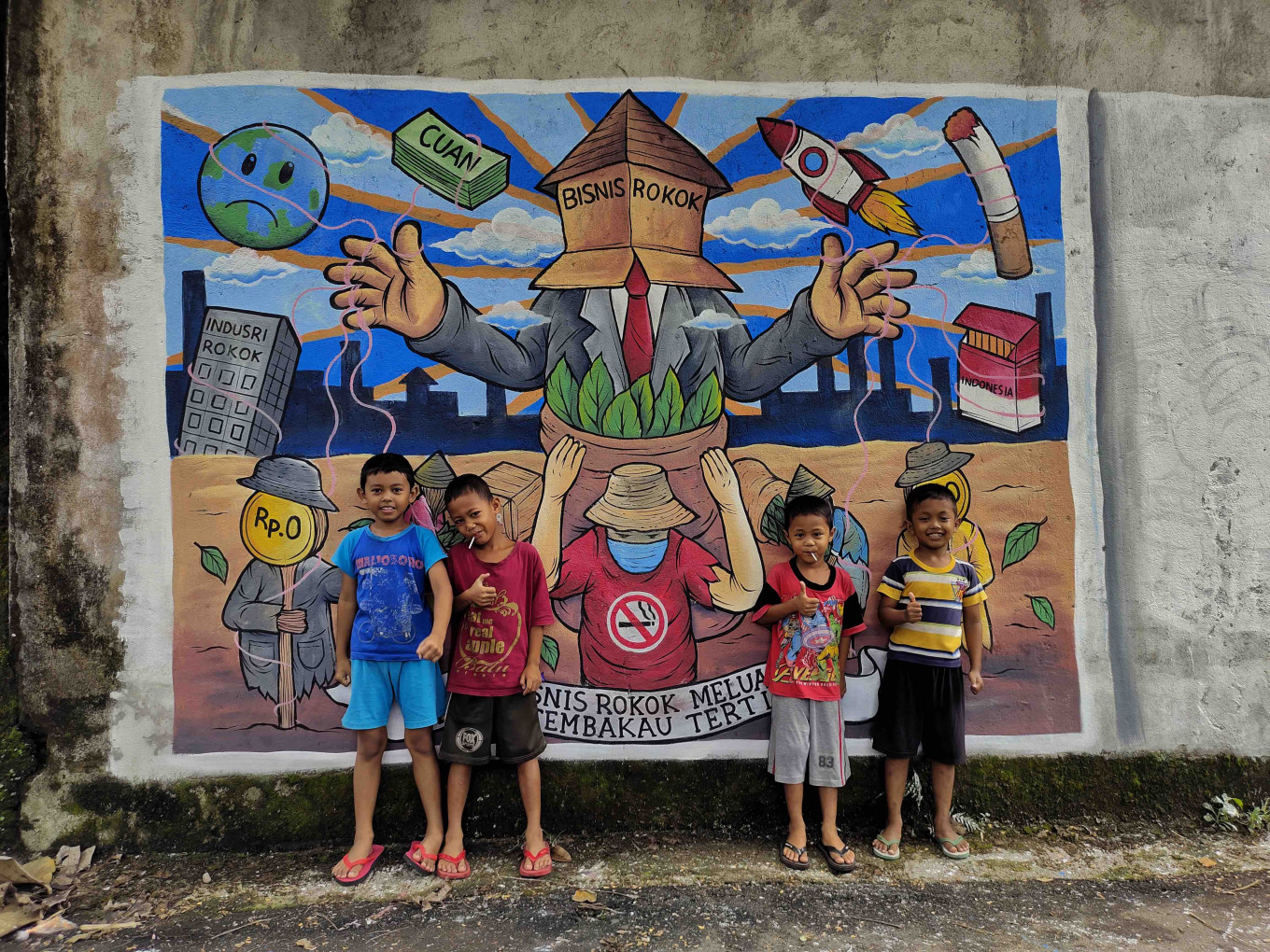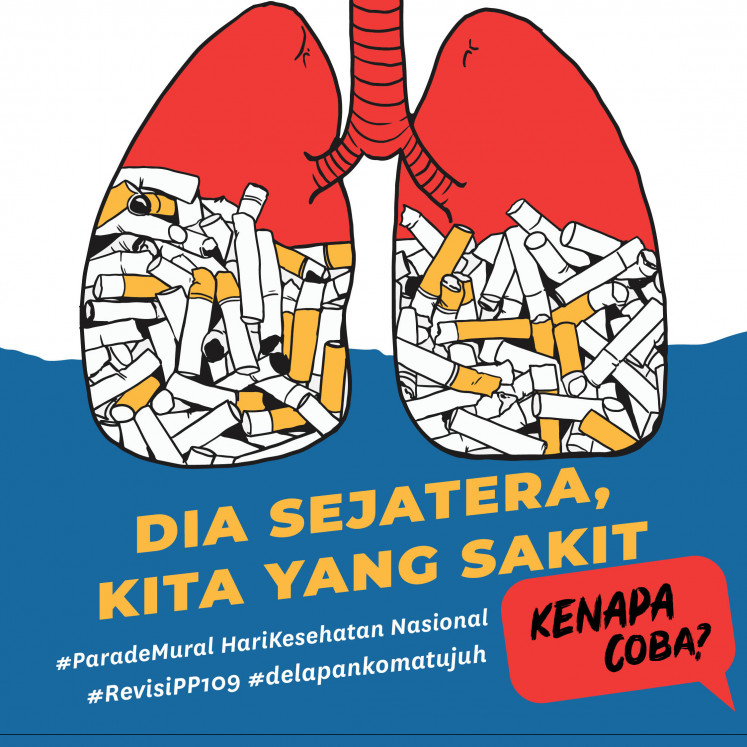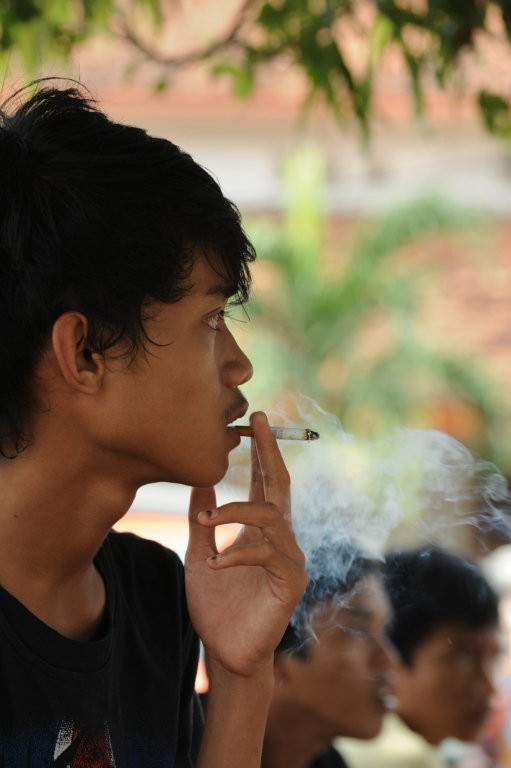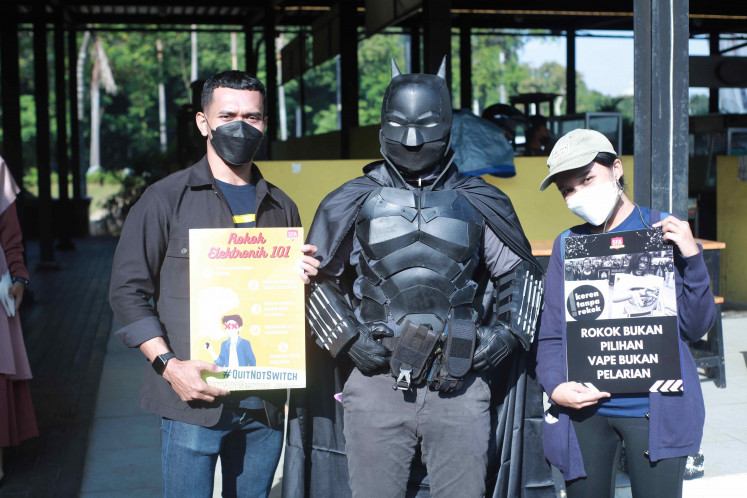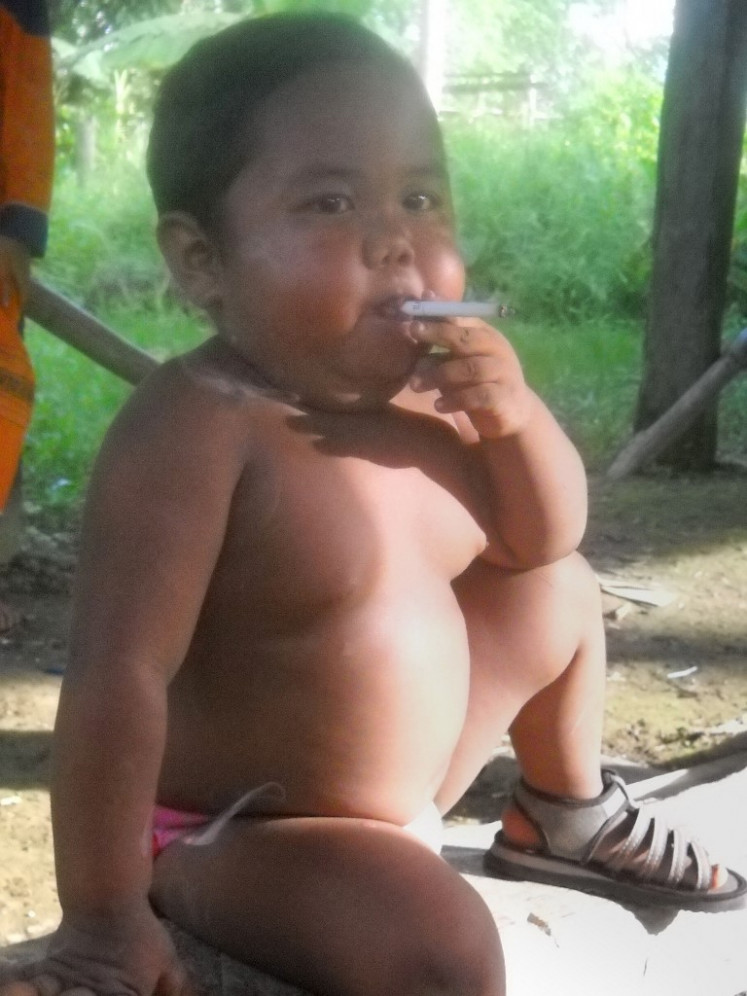Popular Reads
Top Results
Can't find what you're looking for?
View all search resultsPopular Reads
Top Results
Can't find what you're looking for?
View all search resultsEndless smoke: Cigarette campaigns persistently target Indonesia’s youth
Change text size
Gift Premium Articles
to Anyone
Cigarette ads target young Indonesians with youthful imageries and slogans, as proper advertising law remains inadequately enforced.
“They are handsome and cool young men. I want to be like them,” said Andi, a seventh-grade student living in a densely populated area in Dalung, bordering Bali’s capital of Denpasar.
Andi is talking about the celebrities and models adorning the many cigarette advertisements he passes every day on the way to school in Badung regency, which — formally at least — has already banned outdoor cigarette advertisements.
The ads are created to appeal to the sensibilities of younger Indonesians, from teens to young adults, carrying messages meant to evoke inspirational and aspirational platitudes but vague enough that they cast a wide net. Many are in English. Some examples: “The taste that moves you”, “Never quit”, “Live to the max, style of a new generation'', “Are you bold enough?"
Some ads use conversational slang and terms, undoubtedly to evoke a sense of youth — a time-hallowed positioning method that immediately makes the target demographic feel like a brand identifies with them.
These include Lo Pikir Aman (You think it’s safe?) (A Mild), Jalanin Aja Jangan Dilawan (Just do it, don’t resist), Berisik Gue Berisi (My noise is meaningful).
Seto Mulyadi, a psychologist and chair of the Indonesian Child Rights Commission (KPAI) said that younger Indonesians “are twice as sensitive to cigarette marketing as adults".
The ads also do not contain an obvious depiction of people smoking, but instead of young sportsmen, celebrities and others meant to reflect aspirational masculinity.
“Such images and messages may absolutely fulfill young people’s affective and psychological needs such as peer acceptance, positive self-image and expression of coolness,“ Seto said.
Awareness: 'Dia Sejahtera Kita Yang Sakit,' ('They Are Wealthy while We Are Sick') is one of the 1,000 murals designed by members of Pemuda Penggerak Perubahan, Youth for Change. (Courtesy of Yayasan Lentera Anak) (Courtesy of Yayasan Lentera Anak/Courtesy of Yayasan Lentera Anak)An easy market
A 2018-2019 study involving researchers from the University of Sydney, Udayana University (Bali) and Airlangga University (Surabaya in East Java) reveals that only 11 of every 1,000 outlets do not display cigarette ads in Denpasar. Seven out of 10 retailers display at least one banner promoting cigarette products despite the city’s banning on outdoor advertisement
“We found that 367 out of 379 schools had at least one cigarette outlet within 250 meters. More than half of retailers in Denpasar admitted to selling cigarettes to young people,” explained Putu Ayu Swandewi Astuti, the project manager and lead principal of the joint research.
Wayan Wirya, the owner of a kiosk in Monang Maning, which is located close to many schools in Bali, said that while he felt bad about selling "loosies" (single stick cigarettes) to students, it hasn’t prompted him to stop.
“What else can I do to survive in Denpasar?,” Wirya said.
As many as 76.6 percent of students who currently smoke usually buy cigarettes from mini-marts, street vendors and kiosks.
A 2019 report from the Global Youth Tobacco Survey, conducted jointly by the World Health Organization with the Health Ministry and the National Health Research and Development Insititue (BRIN) involving 9,992 students in grades seven to 12 aged 13-15 years, revealed a grim picture.
Around 19.2 percent of students in Indonesia (35.6 percent of boys and 3.5 percent of girls) currently use tobacco products. Around 18.8 percent ( 35.5 percent of boys and 2.9 percent of girls) currently smoke tobacco.
Balinese teen Wisnumurti, 18, said he smoked for the first time when he was in junior high school out of curiosity about the taste of cigarettes.
“Now I am addicted. I smoke every day and I enjoy it. I buy cigarettes using my pocket money from my parents. I have never told them about my smoking habit. I just ask them for more money to buy books,” said Wisnu.
High school student Bagus Mahendra, 16, conceded that while he knew smoking “is not good and it causes cancer or other diseases”, he was often tempted and wanted to join in whenever his friends lit up.
I Komang Arta Saputra, a principal at SMA PGRI 2 high school in Denpasar, said that shielding students from seeing cigarette advertisements and keeping them from smoking was a challenging task even as “the majority of schools in Denpasar have already been designated as ‘A free-smoking and no tobacco zones', under Regional Government Regulation (Perda) No. 7/2013 on free-smoking zones".
"Sensitive markets": Indonesian youths smoke cigarettes while hanging out in a park in Jakarta on May 28, 2010. Younger Indonesians “are twice as sensitive to cigarette marketing as adults,” according to Seto Mulyadi, a psychologist and chair of the Indonesian Child Rights Commission (KPAI). (AFP/Romeo Gacad)Flourishing industry
Indonesia is home to a whopping 1000 cigarette companies, according to data from antitobacco resource website Tobacco Atlas from 2019.
The data also reveals Indonesia as the second-largest cigarette market in the world by retail volume. As of 2018, major tobacco companies in Indonesia included Philip Morris International (PMI) subsidiary HM Sampoerna with 28.3 percent of the cigarette market share by volume (Philip Morris Indonesia holds an additional 4.8 percent), British American Tobacco (BAT) subsidiary Bentoel Group with 7 percent and domestic companies Gudang Garam with 25.2 percent, Djarum with 12.7 percent and Nojorono Tobacco Indonesia with 4.2 percent.
The Industry Ministry estimated that 332.38 billion cigarettes were produced in Indonesia in 2018, beyond the targeted of 260 billion cigarettes.
From the cigarette industry’s perspective, underage youths are crucial to the future of its business because it is during this time that smoking habits tend to form.
“Our study shows that tobacco firms’ aggressive promotions and cheap cigarette prices are reasons why Indonesian boys and girls alike smoke more than others in the Southeast Asia region,” said Putu Ayu Swandewi Astuti, who has also conducted numerous studies on tobacco retail marketing and tactics in Indonesia targeting young people.
Setbacks
Soemarjati Aryoso, chair of the Tobacco Control Support Center of the Association of Indonesian Health Professionals (TCSC-IAKMI), claimed that Indonesia had actually issued a law on health (Law. No. 36) stating that “tobacco products are addictive substances and, therefore, they should not be advertised".
The country also has numerous government regulations, including Government Regulation (PP) No. 109/2012, that ban cigarette promotions and sponsorships.
“The Health Ministry initiated to revise the government regulation PP No. 109/2012 expanding bans on online advertisements and larger pictorial health warnings [PWH] from 40 percent to 90 percent. Sadly, the State Secretary's Office returned the revision to the Health Ministry in November 2021.”
However, the industry was quick to deny it, although only one out of 1,000 companies contacted for this article agreed to respond.
Elvira Lianita, director PT HM Sampoerna TB, said in an email reply that the company had been consistently committed to complying with the prevailing laws and regulations when operating its business activities, including PP No. 109/2012, which specifically regulates restrictions on tobacco advertising, promotion and sponsorship, among other things.
“We are firmly opposed to children smoking and we do not market our products to minors. Sampoerna always ensures that our promotional activities and materials are only directed to adult smokers aged 18 years and above as stipulated under prevailing laws and regulations,” said Lianita.
Sampoerna, she added, launched the Retail Access Prevention Program in 2013 educating retailers not to sell cigarettes and tobacco products to minors.
“Until the end of 2021, the program has reached more than 1.5 million retailers across Indonesia.”
Advocacy: Members of Social Force in Action (SFA) for Tobacco Control held an education and advocacy campaign at Gelora Bung Karno Sports Complex on March 27, 2022. (Courtesy Social Force in Action for Tobacco Control) (Courtesy of Social Force in Action for Tobacco Control)/Courtesy of Social Force in Action for Tobacco Control))Cost of advertising
Eka Sugiarto, chair of the Indonesian Advertisers Association (APPINA), stressed the importance of the association’s members, which produce cigarettes and tobacco products, to abide by advertising ethics, renewed in 2020.
“The ethics have elaborated regulations on how cigarette and tobacco products must be advertised and the producers/advertisers must strictly abide by the rules, “ she explained, adding that the ethics were based on PP No. 109/2012, Article 27.
Sugiarto conceded that cigarette companies were among the 15 top advertisers on televisions in 2020.
Eleanor Crum from AC Nielsen’s Headquarter explained that cigarette and tobacco advertising expenditures in Indonesia between January-November 2021 reached Rp 9.06 billion (US$630,964).
“That excludes advertising expenditures in December 2021 as we have not calculated those yet,” Crum said in an email to The Jakarta Post.
Meanwhile, Bambang Sumaryanto, chair of the Indonesian Advertising Ethical Body (DPI), explained that the advertising ethical code had been revised in 2020 to also include the advertising of cigarette and tobacco products on the internet and social media platforms, especially when they target minors.
Exposed to tobacco: Two-year-old Indonesian boy Ardi Rizal puffs on a cigarette in the yard of his family home in a village on Sumatra island on May 16, 2010. (AFP/Sriwijaya Post/Ahmad Naafi)Loopholes and the internet
With over 171 million users in Indonesia, the internet serves as one of the most effective ways for companies, including cigarette companies, to promote their products, especially to young people.
“The government has not yet issued any regulation regarding cigarette ads in digital and social media platforms, while at the same time, young people are primarily seeing tobacco ads via social media,” Sumaryanto said.
Josua Sitompul, head of law and relations of the directorate general of informational Application at the Communications and Information Ministry, said that “they [cigarette companies] pervasively use influencers and entertainers who can convincingly share their smoking experiences, as well as electronic cigarettes, to their massive number of followers, mostly teenagers".
The ministry has already found content on more than 141 social media channels, including Facebook, Instagram, Youtube, TikTok and other platforms, that have promoted cigarette and e-cigarette ads.
“But we have to wait for formal requests from any ministries or related government institutions to take down those content,” he said.
The absence of coordination and law enforcement has created big loopholes for cigarette and tobacco-related industries, allowing them to enjoy a limitless virtual space to lure children like Andi.
“My friends say that if you don’t smoke, you don’t look like a real man and you are not cool as those celebrities portrayed in the ads. I feel stress-free and joyful when I smoke, ” said Andi, lighting up his cigarette.
*The writer is a founding board member of the Asia-Pacific Media Alliance (APCAT) for Health and Development

